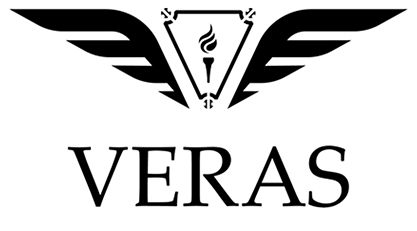The face of political engagement, everything from how you vote to how you interact with public representatives, may soon undergo a massive shift thanks to a new virtual platform created by University of Lethbridge students.
Veras Technologies INC. is a blockchain-driven, secure voting platform that allows users to sign in virtually and cast ballots from anywhere in the world. It reduces the need for polling stations, group gatherings and manual manipulation of ballots, creating access to the political process like never before.
“We were sitting around trying to come up with a project for a blockchain hackathon and started talking politics,” says Veras Chief Executive Officer, Peter Hurd-Watler, a fourth-year student in the Dhillon School of Business. “Divine (Okonkwo, a freelance graphic designer and Veras team member) tells me how much he doesn’t trust the electoral process in his native Africa and how they still use flimsy pieces of paper. I told him it was the same thing here in Canada, except with fancier pieces of paper!
“That was kind of the lightbulb moment and I thought blockchain could possibly be a solution for this.”

The group began working on its idea in May 2019. Hurd-Watler did an applied study course over the summer focusing on the value of blockchain in reducing vulnerabilities in Alberta’s current election system. By summer 2020, with support of the U of L’s Agility program, they were ready to test the concept at the 150Startups’ Innovation Rodeo student pitch competition. It won both the regional and final championships — as well as $10,000 and the opportunity for Hurd-Watler to go to Draper University in Silicon Valley in June 2021 for a five-week entrepreneurial accelerator program.
“Agility was really helpful in that they had a framework built on how to test your idea before putting a bunch of money into it,” says Hurd-Watler. “Their advice and guidance over the past year has been really important in helping us move this along.”
Brandy Old (BA/BEd '17) is the business advisor for Veras and the Agility program director. She says the blockchain approach used by Veras was a great starting point for the rising company.
“When I first started working with Peter, he had a bold idea that seemed impossible,” says Old. “His idea to introduce blockchain to solve an age-old problem illustrates how technology can unlock new and innovative solutions.”
Hurd-Watler studied at the U of L’s Lethbridge campus but moved back to Calgary due to classes being moved online. Veras is now working on developing the front-end, back-end, and blockchain of their Blockchain Smart Voting System with the help of their newest team member, Software Engineer Ismail Lawal.
The Veras platform answers the question: if we can do our banking securely through our smartphones, why can’t we vote using the same technology? If adopted, it potentially blows open the political process, creating easier access to voting for marginalized populations such as the disabled community that might have difficulty accessing polling stations, or First Nations and rural citizens who face long commutes to cast a ballot. In addition, military personnel stationed overseas could vote remotely using Veras.
“Some of the people we interviewed from marginalized communities were having trouble getting their voice heard,” he says. “This is all about connecting the people to the government and the government to the people. It’s beyond just voting.”
The Veras group also interviewed elected officials and discovered they too struggled to find a way to engage with constituents.
“Social media is bombarded with fake accounts and trolls and it’s hard for them to differentiate between real and fake voices,” says Hurd-Watler. “With Veras, your identity is linked to your account, so you know it’s a real person you are interacting with. Representatives can talk to their constituents and know it’s a legitimate interaction.”
Hurd-Watler is part of a youth demographic, aged 18-24, that realized just a seven per cent voter turnout in the last Alberta election. Through Veras, he hopes to see that change.
“We see Veras as a path to increasing voter turnout and accessibility,” he says. “We think this can be a consolidated hub for political voicing for both voters and elected officials that will really shape how future generations interact with their government.”
To learn more about Veras, go to Veras.ca.